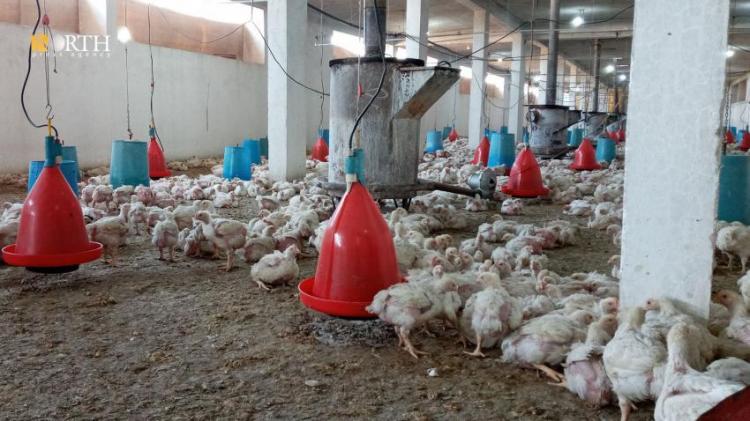Raqqa – North-Press Agency
Ahmad al-Hassan
Poultry farming is one of the new projects in Raqqa, as its history doesn't exceed 20 years, as the local market was previously relying on meat brought from other regions, such as Idlib, Aleppo countryside and other areas that were working in this field long time ago, until poultry was spread in Raqqa countryside to cover about 80% of the local market's need for white meat.
Poultry farming during the control of ISIS
During the control of the Islamic State terrorist group (ISIS) over the region, poultry farming declined till most of the farms were closed, due to the violations imposed by ISIS militants on the poultry men, bringing the price of one kilo of chicken to SYP 2,500 during days of ISIS control.
ISIS, and before it the armed opposition groups also dumped the local market with the frozen chicken imported from Turkey, which was with low quality and low prices, while the diseases caused by these meats led ISIS to prevent using it in the local markets.
Poultry farming during SDF control
After the control of the Syrian Democratic Forces (SDF) on the region and the establishment of the Economic Committee, poultry farming returned to prosperity again, due to the facilities granted to the poultry men, so that the price of a kilogram of white meat ranges between 600 and 800 SYP in most cases.
Prices rose again after the Turkish military invasion in northeastern Syrian, with the rise of the exchange rates of the U.S. dollar, as the poultry man Adnan Mohammad al-Sharif attributed this rise to several reasons, by saying: "The rise of the dollar has affected our work significantly, because we buy in the dollar and sell in the Syrian pound.”
al-Sharif also added that, "before the start of the recent events, we used to buy chicks with 40 cents, and a ton of fodder with $400, but now, after closing the roads, we are buying chicks with 50 cents, in addition to one ton of fodder with $450, except for the exchange rate itself.”
He also explained that, the closure of the crossings and the dependence on the Syrian goods caused a significant decline in their work, as he said: "We used to buy the imported fodder with animal characteristic, but now we are buying Syrian fodder with a low plant characteristic because it doesn't give the result that the imported fodder gives.”
The poultry man attributes the causes of their losses and the decline in their work to other factors, the most important of which are the diseases that overwhelmed the poultries in the recent period, because "after the use of the Syrian fodder, many diseases appeared in our poultries, where more than a hundred birds die every day,” Adnan al-Sharif said.
Likewise, the price of diesel and the dependence on coal instead – according to al-Sharif – were among the reasons for their work decline, confirming this by saying: "We used to buy a barrel of diesel oil with 25,000 SYP, but now we buy it with 40,000 SYP, without providing any support from the Economic Committee.”
For his part, Munzer Rifat al-Saleh, the supervisor of the Animal Resources Office of the Agriculture and Irrigation Committee in Raqqa Civil Council explained that, a disease pest called "Newcastle" is the main cause of the death poultry in the recent period in Raqqa, regretting being not knowing the causes of the disease, finding a treatment and methods of prevention till now.
Al-Saleh added: "We took samples from the dead birds, and we are waiting for the results to provide the vaccines in order to reduce this disease and pest.”
Al-Saleh talked about the preventive measures, saying: "Pits were prepared to burn the dead birds and bury them according to the health conditions, and poultries were sterilized and disinfected.”
Al-Saleh attributed the spread of this disease for several reasons, including: "The failure of owners of trucks carrying chickens to comply with safety conditions, the weakness of experience among some poultry men, was one of the factors of the spread of this disease through their movement among the poultries, which led to the transfer of the disease from one poultry to another.”
With regard to the infection which this disease may cause to a person, al-Saleh affirmed: "We call upon the citizens not to be afraid of this disease because it is specialized in poultries only, and it has no harm to humans.”
Poultry farming is considered as a main tributary of the tributaries of the local economy because of the availability of meat at low prices, compared to the prices of red meat, which requires the concerned authorities to take effective measures to support this vital sector.

